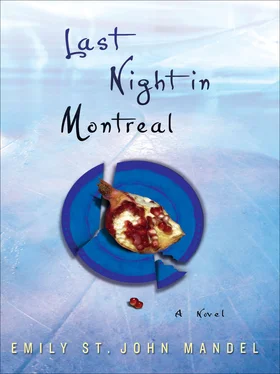“What did you say? I couldn’t hear you.”
“My parents were in a traveling circus,” she told him, gorgeous and exhausted and coming undone sometime between three and four o’clock in the morning. “Did I tell you that?”
“A couple of times, yes. It’s kind of unbelievable.”
“Isn’t it? A family of actual circus people. My grandparents too,” she said. “Both sides. Do you believe the desire to travel is genetic?”
“You sound like Lilia.”
Her name broke the conversation and they stayed together for a long time in silence. The moon was setting behind the rooftops on the other side of Boulevard St.-Laurent. They had had the same argument every night for a week: Michaela wasn’t going to tell him where Lilia was unless he told her about the accident. Strange limbo. Michaela lit a new cigarette off the end of the old one and then dropped the old one into the last few drops of her tea. She turned the still-warm glass between her hands for a while, smoking, looking down at the extinguished ashes. She smoked with the practiced elegance of a career smoker, one who was perhaps born holding a cigarette and doesn’t mind admitting that she smokes rather well.
“She traveled beautifully,” she said finally.
“You’re the only person I’ve ever met who actually literally chain smokes,” Eli said.
“She’s a bit like a ghost,” said Michaela, still thinking of Lilia.
“No, not a ghost. It’s the world that’s ghostly.”
“What was it like, living with her?”
“She was different than anyone I’ve ever. . she had strange habits,” he said. “But there was something perfect about it.”
“All of it?”
“Of course not all of it. Nothing’s perfect all the time.”
“What, then?”
“The times we were alone. We spent a lot of time alone in the apartment, or out walking, and there was this silence that’d fall between us, and I know this sounds. . I know this sounds stupid or absurd, but it was perfect. I can’t explain it any better than that. The silence was perfect.”
“Silence? What else?”
“We had these friends in Brooklyn — actually, I had these friends, she didn’t have friends, she came out of thin air with a suitcase— anyway, I had these friends who thought they were artists. Well, I don’t know, maybe they were. Maybe we were. I can’t judge it anymore, what we were doing there. I didn’t think that what we were doing was good enough at the time, but maybe it was. I don’t know.”
She watched him without speaking.
“You know what bothered me about it? Everyone was supposedly committed to the pursuit of truth and beauty, or at least one of those things, but no one was actually doing anything about it, and it seemed all wrong to me. The inertia, I mean. The inertia made everything seem fraudulent. There we were, talking about art, but no one was doing anything except Lilia. She was taking pictures. She spoke four languages.”
“Five.”
“You’re counting Russian? Anyway, what I’m saying is that no one was doing anything important except her. She worked as a dishwasher, she lived cheaply, she took beautiful pictures and translated things. She never made any money off it, it was just something she did. The point is, she never talked about it. She never seemed like she was posing. She never theorized or deconstructed. She just practiced her art, practiced it instead of analyzing it to death, and it rendered the rest of us fraudulent. There aren’t many people in the world. .” He stopped talking and shook his head. He didn’t trust himself to continue.
Michaela was silent for a moment, looking down at her hands. “I have a picture she took,” she said finally, “if you’d like to see it.” She was reaching for her purse at her feet. She put it on the table, the fake leather gleaming under the café lights, pulled an envelope from a secret inside pocket and passed it to him.
The corners of the envelope were softened with wear. It held a single black-and-white photograph of Michaela and Lilia standing side by side before the mirror of a public washroom, a line of cubicle doors open behind them. Lilia held her camera just below her face with both hands. There were dark circles under her eyes, and her face was serious and still. Michaela, beside her, was smiling slightly, and both of them were watching Lilia’s eyes in the mirror.
“Where was this taken?” He couldn’t stop his voice from shaking. He was looking into Lilia’s eyes for a trace of something, remorse perhaps, but of course she could have been thinking of anything.
“Here,” she said. “In the washroom at the back.” She took the photograph from him, put it back in the envelope, and put the envelope back in the secret pocket in her bag.
The year Michaela was fifteen, she lived alone. Her father was traveling in another country.
Christopher was moving quickly. He was having strange dreams about cars and pay phones. He had never felt so clear. In a mountainous state in the middle of the country, he realized that he’d fallen into Lilia’s wake. He’d felt himself for a long time to be moving closer to her, drawing near as he circled outward from the town of Leonard, Arizona, but it still seemed faintly miraculous when the trail suddenly became clear. At first he didn’t believe it. But a woman at a quiet gas station said that yes, upon reflection, she did seem to recall a man and his daughter passing through yesterday morning with suitcases in the back of the car, and a clerk at a motel down the highway said the same thing. He trailed them down into Florida, through Miami, then up into a semiurban hinterland of highway overpasses and towns with wide empty streets, straggly palm trees, blank almost identical houses set far back from the street. He followed them silently, traveling alongside, propelled and haunted by visions and dreams. He moved alone and weightless over several Midwestern states, just behind or sometimes alongside the fugitives, just out of sight. He had always had an intuition stronger than any of his senses, and it seemed that it had hardened and crystallized into something formidable. What he found, and this was both disturbing and miraculous (that word again, but no other word came to him when he thought of it), was that after he’d seen them for the first time (emerging like apparitions from a chain restaurant in a small city in Illinois across the street from a movie theater on Lilia’s birthday, climbing back into their car, Lilia stopping first to take a photograph of the street) he always knew where they were. Sometimes he gave them a head start, to test himself: an hour, a day. He’d stay in his motel room, reading in solitude for long periods; he bought books in the towns he passed through, histories and biographies mostly, and left them behind in motel rooms when he was done with them. The only books he kept were a battered copy of Bullfinch’s Mythology and the two Bibles that Lilia had written in. The page that she’d written on had been torn out of one of them years earlier — he suspected his vanished wife — but he had a photocopy of the missing note folded into the back page. It was the Shakespeare that he went back to most frequently; he had been reading Twelfth Night back when he’d first taken Lilia’s case, and there was something soothing about the continuity. He would read for a while and later he would check out of the motel room and drive after them, and find as he traveled that he knew where they’d gone; sure enough, he’d see their latest car in a motel parking lot, or drive past on the street of the next town as they walked together. He felt that he could exist this way forever; just behind them, watching over them, traveling alongside, aware of their every move, able to bring them in at any time. He didn’t have to do anything. The connection was effortless. His family was suspended; it was as though they’d disappeared. Weeks passed when he didn’t think of them. It was a beautiful state of limbo to be in.
Читать дальше












